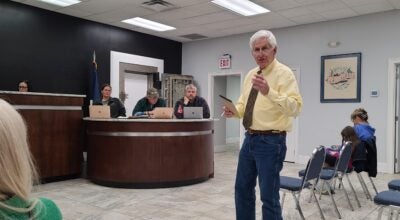Perryville heats up over historic preservation
Published 6:14 am Saturday, August 4, 2018
“It all boils back down to one thing: Nine out of 10 people don’t want to be told what to do with their property.”
That was the comment made by Perryville City Council member Brian Caldwell after several contentious rounds of discussions Thursday night over Perryville’s proposed historic preservation ordinance.
The discussion began earlier in the meeting with resident Sylvia Hensley, who was on the agenda as part of the “open forums,” when the public can speak. She passed out a three-page letter and began to read her concerns out loud.
Hensley said the proposed ordinance would give “tremendous power to an unelected group of unnamed people who don’t mind telling their neighbors what to do with their own property.” She said proponents of the ordinance say it would only apply to properties owned by Main Street Perryville and the city, and to residents who “opt-in,” but said there are phrases throughout the document that contradict that assertion, and took issue with what the ordinance describes as “certificates of appropriateness” needed before a person can undertake certain actions on properties designated as landmarks.
She said due to Perryville’s role in the Civil War, a large portion of the town is already within a historic district. She also took issue with the ordinance giving a historic preservation commission the power to designate what are historic buildings, sites, districts and landmarks.
Council member Julie Clay interrupted Hensley, asking, “Are you going to read all of this to us?”
“Yes, dear, I am,” Hensley said, and offered the explanation she chose to read the statement because she was “shut down after one question” during July’s council meeting.
“Do you feel that the city council members are not capable of reading?” Clay asked her.
“I know you are,” Hensley replied.
“Oh, OK,” Clay said.
“You shut me down when I asked one question at the last meeting, gave me a non-answer and he (pointing to Perryville Police Chief Parker Hatter) told me to sit down. That’s why this time, it’s in writing. This is what I have concerns about,” Hensley said.
Clay continued to object, and Hensley asked, “Is this not an open forum?” Council member Brian Caldwell interjected, “Let her finish, Julie.”
“I would prefer that you not read three pages to us,” Clay said.
“I would prefer that you not interrupt,” Hensley replied, and referred to council member Paul Webb as the “little timer” who could stop her after five minutes.
“Have at it,” Clay said.
Hensley continued, questioning how much it would cost property owners affected by the ordinance in different ways.
“Property owners are invited to ‘opt-in,’ but can they opt out if the pie-in-the-sky grants don’t materialize and the 5 percent city property tax discount is illegal or is a 1-year-wonder?” she asked.
Hensley said the preservation commission would cost the city money, and gave a section from the ordinance about how members will serve without compensation, but will be reimbursed for expenses in accordance with rules they adopt.
“What expenses? Trips to preservation conferences in Charleston and Savannah?” Hensley asked.
She described the “unkindest section of the ordinance to be at the tail end,” which lays out the penalties for noncompliance. “Any persons violating any of the provisions of this ordinance shall be fined not less than $50, nor more than $500 for each offense, and each day’s violation shall constitute a separate offense. That’s a minimum of $1,500 a month up to $15,000 a month.”
Hensley said the ordinance implies that Main Street Perryville can’t be trusted with its own properties; the city council can’t be trusted to take care of the city’s properties; and private property owners “certainly can’t be trusted to take care of their own historic buildings without proper supervision and correction.”
After a brief second of silence, Clay started to move on to the next person listed on the agenda, until council member Steve Bailey made the motion to table the ordinance, and Caldwell seconded it.
Clay said, “No,” just after the “yes” vote.
“I mean, do we not get an opportunity to speak? We’re just going to shut it down?” she asked.
“You were moving on to the next speaker 30 seconds earlier, Julie,” Caldwell responded.
Clay pointed out the council was currently in the “open forum” part of the meeting, and the historical preservation ordinance was listed further down, in old business, for the council to discuss.
After council members began talking over one another, stating opposing opinions about the proposed ordinance, City Attorney Winfield Frankel broke through the chaos and said it seemed to him that a lot of the issues stated by Hensley are pretty well-founded. Most of the issues seem to occur in sections 6 and 7, designations of landmarks/historic districts and approval of changes to them.
“The whole spirit of this thing … it’s supposed to be an opt-in,” Frankel said.
Clay said it most definitely is, and is set up in order to help the city get more money to support its historical landmarks and buildings. Resident Kelly Gray argued with Clay for some time, disputing that extra funding is the real reason for the ordinance being pushed. She also tried to dispute what the eligibility requirements are for the 5-percent property tax break.
“This ordinance is useless,” Gray said.
After more back and forth ensued, council member Caldwell said he’s not opposed to having a historical preservation ordinance, but, “if you’ll recall, right off the bat, I’ve always been against the 5-percent discount on property taxes. I do not think that’s a good idea, not from day one.”
He said he is against the idea of giving a specific group a break on property taxes because it opens a “whole can of worms. I don’t think this is the way to go about it.”
Frankel got the floor back, and said he wasn’t present for the last meeting, “… so I don’t know how the tenor of that meeting went. It appears not very well.” He reminded the council and residents that nothing had been voted on yet nor had been enacted and hopefully that would “get everyone to calm down.”
Frankel said after hearing objections, he understood where some of the fear came from. “But this is why we have these types of meetings, so people can voice their concerns.” He said the ordinance “has a good basis behind it,” and is only attempting to ensure the many historical properties in Perryville are treated with some sort of deference to what they are.
But he did understand where residents felt it reads and “kind of sounds like” someone can point to sites around town and designate them, and it just needed to be cleaned up some.
Some residents spoke up that the commission will be given the authority to fine people, and that’s where the funding will come from. Comments were made inferring the city should set up a legal fund for the trouble it will get itself into with the new ordinance and commission.
Clay told some residents a city is an organized community, and “if you didn’t want to be governed by anything, why did you move into a city?”
Resident Steve Walker, owner of the former Elmwood Inn building, said he and his wife have owned the property for about a year. He said a preservation commission is not necessary and would only lead to more red tape and bureaucracy.
“Had this ordinance … been in place when we bought Elmwood, we would not have proceeded with the purchase,” he said.
Walker said the ordinance ” …contains nothing new, and has been applied in many other places across three continents. It is a method more suited for larger population centers, in communities which are not close, and used as an act of last result to enforce compliance.”
He said it is too heavy-handed for Perryville and needs to be rewritten with more of a community-based approach.
Walked finished speaking to a round of applause.
The council voted 4-1 to table the ordinance in order to revise it with help from the city attorney, and bring it back in September. Council members Caldwell, Bailey, Webb and Amber Noakes all voted in favor; Clay voted against tabling.
The 2.7 million dollar question
Also during Thursday’s meeting, City Attorney Frankel showed Clay a historical preservation ordinance drafted and supposedly passed in 1988.
“We might need to look at the minutes from 1988,” he said. The older ordinance was brought up earlier in the meeting, but it was recalled that it only had one reading.
Vicki Goode, executive director of Main Street Perryville, told the council the ordinance actually did have two readings, but it was never published in the paper — a legal requirement after an ordinance is passed. She said it was under former Mayor Rick Lee’s tenure.
Ordinances do not take effect as law until they have passed two readings and been published in the local paper of record.
“I don’t know how it made it into the ordinance book, then,” Frankel said.
“Um, because of the Second Street project,” Clay said. “We got a bunch of money back on that, and we needed to have (the ordinance) in order to get the money for doing the Second Street project … when we redesigned the sidewalks and street lights …
Some council members said if the ordinance wasn’t published, then the grant money was acquired illegally.
“Then we owe back $2.7 million,” Clay said, referring to grant monies received for the streetscape project.






